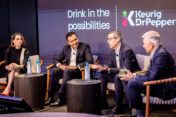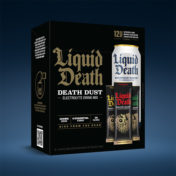Alcohol Alternative
BlueTriton, Primo Water, Advantage Solutions, L.A. Libations, Athletic Brewing, PepsiCo Beverages North America, Coca-Cola India, and More
Read More
Executive Q&A: Keurig Dr Pepper CEO Tim Cofer, Executive Chairman Bob Gamgort
Company Has ‘One Leader,” Gamgort Says of Leadership Transition to Cofer
Read More
Monster, Red Bull Post 2023 Growth. Underperform Category.
Celsius Exceeded $1 Billion in Sales
Read More
Powder Boom: Liquid Death Adds ‘Death Dust’ Electrolyte Sticks
Kraft Heinz Adds Functional and Mixer Lines to Crystal Light
Read More
Report: Red Bull, Coke, Celsius Top Influencer Marketing ROI Leaderboard
Influencer-Founded Prime Holds No. 4 Slot Among Non-alcoholic Beverage Brands
Read More
Future Smarts Highlights From Coke, PepsiCo, KDP Leaders
Coke North America President Mann to Keep Volume Pressure in Focus.
PBNA Supply Chain Chief Jordan Talks AI, Automation, Electric Trucks.
Whitmore Intent on Territory Optimization. Watching U.S. Alcohol Sector.
Read More




